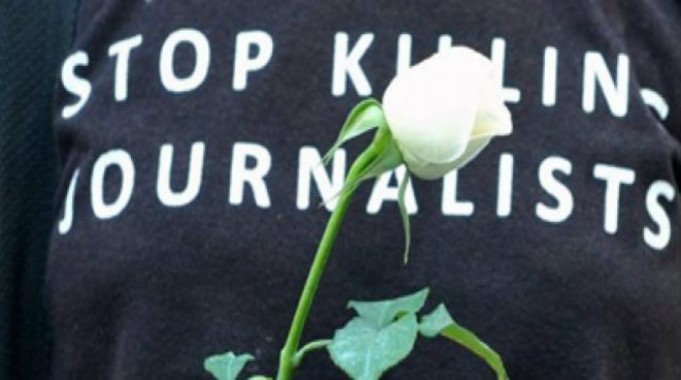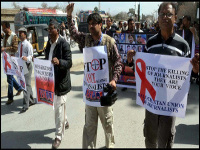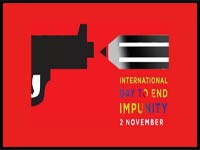Stop killing us
On a chilly autumn afternoon on November 2, dozens of journalists assembled in the House of Commons in London to observe the International Day to End Impunity for Crimes against Journalists.They spoke in one voice and had one demand – stop the killing of journalists.
An empty chair symbolised the 700 journalists who have been killed in the past decade alone for reporting the news: one journalist killed every five days.
“The last decade has been a turning point as the safe ground that the journalists were operating in earlier was gutted” said Peter Greste, senior Al Jazeera journalist who was incarcerated in an Egyptian jail for 400 days. “Two hundred journalists are in jail, two-thirds of them for sedition against the state.”
Greste, an Australian, still faces a three-year prison term in Egypt despite having been deported.
Lending support to journalists were human rights lawyers and media activists. There was a unanimous view that governments across the world should be made accountable for the killings of journalists in their region. ‘Naming and shaming’ would increasingly be the new tactic adopted to bring pressure on governments in power in the respective countries.
Most of the dead journalists were not war correspondents. Attacks on media professionals are often perpetrated in non-conflict situations by organized crime groups, militia, security personnel, and even local police, making local journalists among the most vulnerable. These attacks include murder, abductions, harassment, intimidation, and also illegal arrest and detention. A recent case is of two Turkish journalists working for a magazine critical of the government being arrested for their coverage of the election.
Thomas Hughes, Executive Director, Article 19 (a London-based human rights organisation that promotes free speech), told the meeting that 14 countries had been named for having more than five unresolved cases against the murders of journalists. India was one of them, along with Bangladesh, Pakistan, Afghanistan, South Sudan, Iraq, Somalia and seven others.
Pen International released the names of all the journalists killed across the globe over the past year. Four Indian journalists featured in that list: Jagendra Singh killed on June 8, Sandeep Kothari killed on June 19, Raghavendra Dube killed on July 17 and Mithilesh Pandey killed on October 24. Pen’s list also included the name of writer and rationalist M. M. Kalburgi who was shot dead on August 30.
“Even the places which we thought were bastions of freedom have fallen and journalists are squeamish about reporting on attacks on journalists. This has to change, said Greste.
William Horsley, International Director, Centre for Freedom of the Media, University of Sheffield, said that countries were being made to be signatories to end impunity but so far the mechanism to make governments accountable to what they were signing had not kicked in. For example, though India was a signatory, no case so far has been resolved. Worldwide, less than seven per cent of journalist murders had resulted in convictions, that is, only 56 of the 680 cases received by UNESCO according to figures released at the meeting.
The occasion at the House of Commons was used to launch a UNESCO report called “World Trends in Freedom of Expression and Media Development: Special Digital Focus 2015” by Getachew Engida, UNESCO Deputy Director-General. Engide called on civil society and parliamentarians of all countries to end impunity and announced that UNESCO plans to observe 2016 as the year of media freedom.
The events in India, with journalists receiving death threats from right wing Hindu groups and a growing tide of intolerance, are clearly part of a wider problem. The encouraging aspect of the House of Commons meeting was the unanimity. What is not so certain is the effectiveness of such protests given the complexity and variety of the conditions found in different countries.









